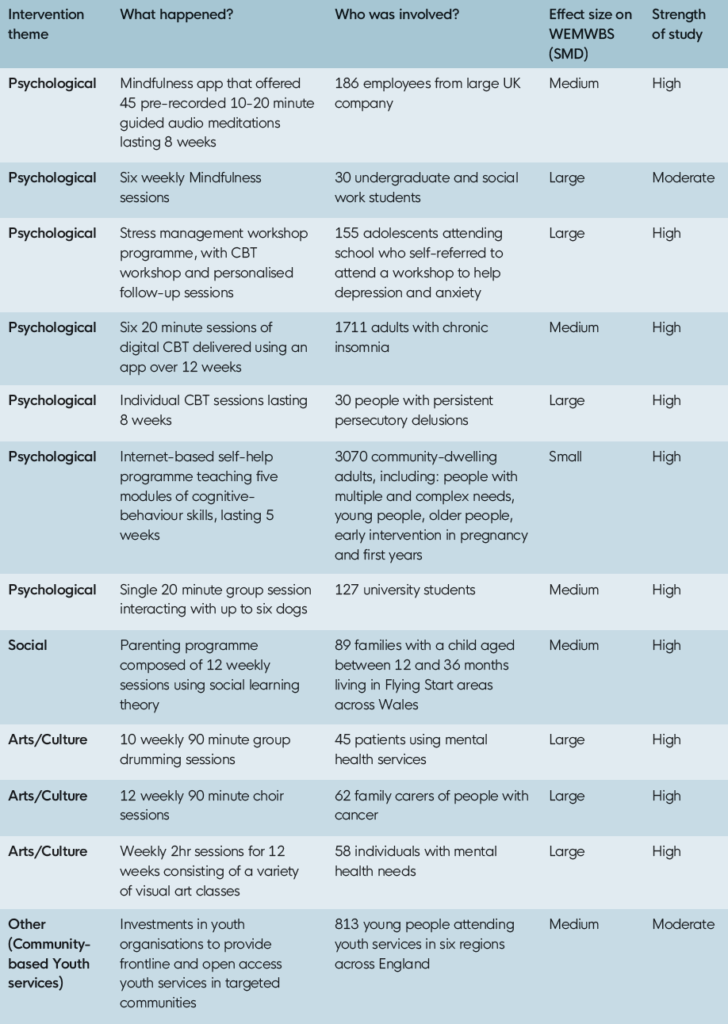What works to improve mental wellbeing, measured by the WEMWBS scales
As the government commits to levelling up the UK, high-quality evidence on what works to address disparities in outcomes and life chances across the country is crucial.
As part of levelling up, as outlined in current government plans, evidence on mental wellbeing will inform a 10-year strategy to promote positive mental health and wellbeing, through the Mental Health and Wellbeing Plan.
Following on from our ONS4 review, we have conducted a rapid review of the evaluation literature which looked at what works to promote positive mental health, as measured by the WEMWBS scales. WEMWBS captures emotional health which is a clear driver of life satisfaction. Evidence from this review can help drive progress on subjective wellbeing and the levelling up programme’s Mission 8.
This Rapid Review gives an overview of:
- The interventions and actions that promote positive mental health
- The state of the evidence
- Gaps in existing knowledge
- Implications for future research and practice
Today we publish two outputs of this work:
- A briefing highlighting the key findings.
- The Rapid Review report, conducted with Kohlrabi consulting.
What we did
Alongside Kohlrabi Consulting, we reviewed evaluations that use the Warwick-Edinburgh Mental Wellbeing scales, or WEMWBS. The review captured the range of interventions and settings in which WEMWBS scales are used, and brought together high-quality findings on what works to improve mental wellbeing in UK projects and pilots.
What we found

High-quality evidence from controlled studies. Source: What works to improve mental wellbeing in the UK – insights from WEMWBS
The review found 115 interventions that reported statistically significant improvements in mental wellbeing.
The majority of these were social and psychological and art-based interventions, including:
- one-on-one guided sessions to improve and educate about resilience
- a peer-led advice service on welfare benefits and health advocacy
- a peer-facilitated four-week programme in prisons
- 10-12 weeks of weekly choir, drumming, and a set of mixed visual art sessions
Our review suggests that the WEMWBS scales are used widely in peer-review publications and for interventions aimed at adults aged 26 to 59.
Over a third of studies used control groups and the remainder were found to be of a high-moderate quality.
Areas of future research interest
The call for evidence for this work resulted in the highest number of contributions we have received for any rapid review, a clear sign of the interest and ongoing work in the area of mental wellbeing.
Our job as a What Works Centre includes collating, synthesising and assessing the effectiveness of policies and practices against an agreed set of outcomes – in this case, ONS4 including life satisfaction, WEMWBS, social capital including loneliness, and job satisfaction.
The findings in the review have an important role to play in guiding evidence-informed decisions to advance mental wellbeing. However, there remain several important gaps in the research:
- More evidence is needed on the effectiveness of promising intervention themes/types, such as:
- Social prescribing
- Community or peer support
- Family wellbeing
- Information and advice support services
- The differential impacts on mental wellbeing for different population groups and in specific contexts, in particular, for children and young people
- The cost-effectiveness of interventions across types and themes.
What’s next?
We want to understand what organisations in any sector can do to improve social capital – and therefore wellbeing – of people and places. We aim to establish what’s already known, how confidently we know it, and where the gaps are so that we can share this knowledge with those who will use it to drive effective action and research.
As part of our work to increase the quality, visibility and use of wellbeing research, the Centre will continue to collate evidence on what works to improve mental wellbeing.
Please get in touch if you want more information about the review or would like to collaborate on future reviews of mental wellbeing.
Our Social Capital: Evidence Review and Synthesis project may also be of interest and we welcome contributions to the call for evidence which is currently live.
